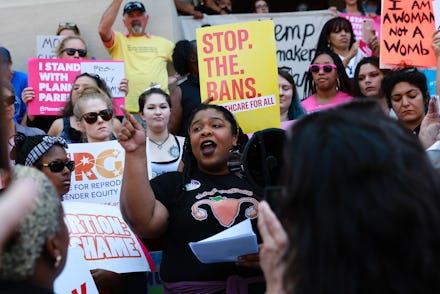A federal judge just permanently blocked Georgia's six-week abortion ban

On Monday, a federal judge permanently struck down a law that sought to make abortions provided after only six weeks of pregnancy illegal. This is a major ruling in the field of abortion access, as dozens of states have instituted their own six-week abortion bans known as "heartbeat bills," based on the false notion that fetuses have discernible heartbeats after just six weeks of gestation. The ruling comes just hours after a court halted a Tennessee anti-abortion law.
The lawsuit was initially filed last year by SisterSong, a Black-led reproductive justice organization, along with the American Civil Liberties Union of Georgia, the Center for Reproductive Rights, and the Planned Parenthood Federation of America. "This win is tremendous, and it is also makes a very bold statement. No one should have to live in a world where their bodies and reproductive decision making is controlled by the state," said Monica Simpson, executive director of SisterSong.
The coalition of organizations argued that most individuals won't even know they're pregnant after six weeks, let alone be able to confirm their pregnancy, schedule an appointment for an abortion, and undergo the procedure before that point. Additionally, getting together the funds for a pregnancy termination can take weeks, as an abortion can cost hundreds of dollars, meaning the time limits disproportionately affect low-income people. It's most common for pregnant people to receive their abortions between eight and 12 weeks of gestation.
What Monday's ruling affirms, advocates say, is that abortion care is a constitutionally-protected right. "Georgia politicians and Gov. [Brian] Kemp, our message to you is clear: Banning abortion is illegal and unconstitutional," said Alexis McGill Johnson, the president and CEO of the Planned Parenthood Federation of America.
Johnson also noted that legislation based in prejudice rather than science, like a so-called "heartbeat bill," disproportionately harms individuals with the least access to comprehensive medical, heath, and reproductive care. Poor, indigenous, Black, immigrant, and non-English speaking patients are most likely to have trouble affording and accessing abortion care, whereas wealthy, white patients are overall less likely to seek abortion and more likely to have the means to travel to another state if they want one. "The reality is that abortion bans are another barrier in a health care infrastructure built on systemic racism, putting basic rights out of reach for Black and brown Georgians and pushing their freedoms further out of reach," said Johnson.
Last year, the bill passed the Georgia legislature by two votes and sparked a national outcry, with businesses vowing to pull operations out of the state in response to the law. Monday's ruling comes just weeks after the Supreme Court struck down a Louisiana law regarding "admitting privileges" on the grounds that the legislation would have forced clinics to close, thus posing an undue burden to those who seek abortions. In striking down the Louisiana's law, the court affirmed that precedent set by Whole Women's Health v. Hellerstedt (2016) and Roe v. Wade (1973).